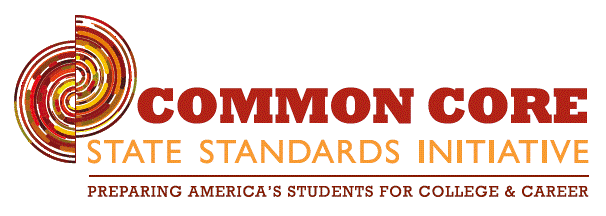I know that my next post was supposed to be about my decision to join Teach for America, but as we educators are acutely aware of--plans change. =)

Instead, let's chitchat a bit about the common core.
As someone who recently graduated, I was introduced to the common core standards before entering the classroom. (Thank God.) While I've studied them to a certain extent, I recently made a new discovery that I hadn't noticed before.
In the past whenever I looked at the common core standards, I looked at it from a grade-specific viewpoint. Choosing the grade I needed and looking at all (or some) of the standards for that grade. However, a few months ago I thought to myself: If the purpose of the common core is to prepare students from K-12 for college, how do the standards become increasingly more difficult as students progress through the grades? So, I sat down, chose a single standard and looked at it from K-12. I was stunned by how much sense the progressive made. The common core standards do clearly show how students should increasingly develop particular skills. I got to thinking some more. How can this new discovery help me and other teachers?
By understanding what is new in terms of skills for each grade level, it makes it easier to discern students' grade levels (in terms of the common core) and how to get them to grade level. It also makes clearer for teachers what skills from the previous year they will be building on in the current school year. This inspired me to create a new document that would present this progression of the skills more easily. While it's still a work in progress, here's a glimpse of the first reading standard for grades 6-12.
As you can see, it's the same anchor skill, but students are expected to utilize the skill in a more sophisticated way each year (see italics). Students progress from simply stating evidence, to evaluating evidence, and evaluating text.
Some questions still remain for me in regards to the supposedly increasing difficulty of what's expected of students.
Laters Gators,
Fatuma

Instead, let's chitchat a bit about the common core.
As someone who recently graduated, I was introduced to the common core standards before entering the classroom. (Thank God.) While I've studied them to a certain extent, I recently made a new discovery that I hadn't noticed before.
In the past whenever I looked at the common core standards, I looked at it from a grade-specific viewpoint. Choosing the grade I needed and looking at all (or some) of the standards for that grade. However, a few months ago I thought to myself: If the purpose of the common core is to prepare students from K-12 for college, how do the standards become increasingly more difficult as students progress through the grades? So, I sat down, chose a single standard and looked at it from K-12. I was stunned by how much sense the progressive made. The common core standards do clearly show how students should increasingly develop particular skills. I got to thinking some more. How can this new discovery help me and other teachers?
By understanding what is new in terms of skills for each grade level, it makes it easier to discern students' grade levels (in terms of the common core) and how to get them to grade level. It also makes clearer for teachers what skills from the previous year they will be building on in the current school year. This inspired me to create a new document that would present this progression of the skills more easily. While it's still a work in progress, here's a glimpse of the first reading standard for grades 6-12.
As you can see, it's the same anchor skill, but students are expected to utilize the skill in a more sophisticated way each year (see italics). Students progress from simply stating evidence, to evaluating evidence, and evaluating text.
Some questions still remain for me in regards to the supposedly increasing difficulty of what's expected of students.
- In what way(s) does textual evidence that "most strongly" supports an analysis (Grade 8) differ from simply citing "strong and thorough" textual evidence (Grades 9-12)? While in grade 8, the student is evaluating which piece of evidence is the strongest, who is deciding that a piece of evidence is "strong and thorough" in the high school grades? The student or the teacher?
- Why are grades 9-10 and 11-12 lumped up together? I've always wondered at this. Do they expect it to take two years to master these particular skills?
Laters Gators,
Fatuma

No comments:
Post a Comment